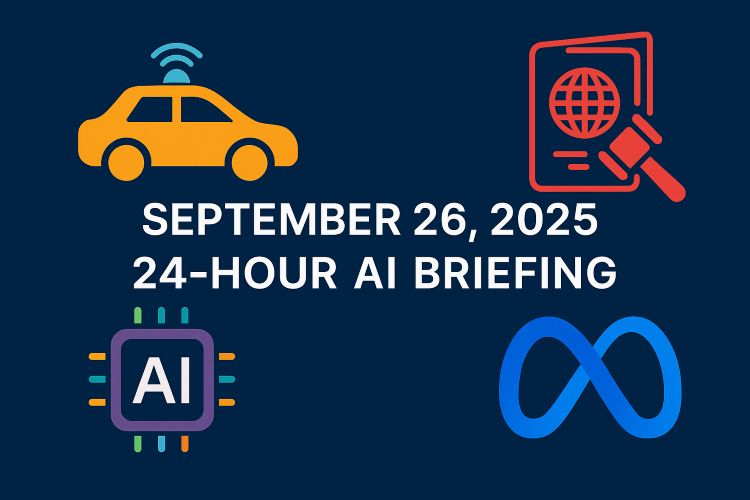AI Navigation
- articleAI Trends
- lightbulb_2AI Tips
- assistant_navigationAI Navigation
- heatHot Articles
- emergency_heat_2Hot Tips
- format_list_numberedPrompt Formatter
- psychologyTest Center(RPI)
September 26, 2025 · 24-Hour AI Briefing: Baidu’s Robotaxi Goes Global, H-1B Visa Controversy, Meta Turns to Gemini
In the past 24 hours, the AI industry has seen major developments: Baidu’s “Apollo Go” robotaxi business sets its sights overseas, U.S. senators question the contradiction between H-1B visa applications and mass layoffs, and Meta is in talks with Google to adopt the Gemini model for advertising precision. These stories highlight the intersection of technology adoption, regulatory scrutiny, and corporate strategy.

Baidu’s “Apollo Go” Seeks Expansion into Australia
Baidu is looking to expand its autonomous taxi business to new markets, including Australia. The company has already achieved operational profitability in multiple Chinese cities, and Apollo Go is now in talks with governments in Australia and parts of Southeast Asia to introduce robotaxis to local streets.
Commentary: Earlier this month, Baidu’s Apollo Go received a license from Dubai authorities to test autonomous driving. Achieving profitability in several Chinese cities marks a critical milestone. While many Western robotaxi companies continue burning cash in pursuit of a viable business model, Baidu has leveraged China’s market conditions, government support, and accumulated technology to break even operationally. The big question: can Apollo Go succeed in Australia, where traffic laws, road conditions, driving habits, and even climate are vastly different from China?
H-1B Visa Debate Intensifies Amid Layoffs
U.S. Senators Dick Durbin and Chuck Grassley have asked ten major corporations to explain why they are filing for large numbers of H-1B visas while laying off domestic employees. The companies include Amazon, Apple, Google, Meta, JPMorgan Chase, Microsoft, Tata Consultancy Services, and Walmart.
Commentary: The H-1B program allows 85,000 high-skilled foreign workers into the U.S. annually, with India (71%) and China (11.7%) as the biggest beneficiaries. The senators’ inquiry touches on a key public concern: if companies are cutting costs and jobs, why simultaneously seek foreign workers? From a corporate perspective, however, H-1B petitions are often part of long-term talent strategies, especially for niche roles that are difficult to fill domestically. If these hires truly target skill gaps, the rationale remains defensible.
Meta in Talks to Adopt Google’s Gemini Model
Meta is reportedly negotiating with Google to leverage its Gemini AI model to enhance ad targeting. The plan involves fine-tuning Gemini with Meta’s advertising data to process multimodal inputs—including text, images, and user behavior—ultimately improving ad targeting across Facebook and Instagram.
Commentary: Meta has poured tens of billions into AI, but still lags Google in ad optimization and conversational AI. Apple’s privacy policy (ATT) significantly weakened Meta’s ability to gather user data, leaving its ad targeting less effective. Against this backdrop, turning to Gemini looks like a reluctant move. It underscores Meta’s dependence on external solutions when its own AI falls short—a striking admission for a company that built its empire on ads.
For more cutting-edge AI updates, business insights, and tech trends, visit:
IAISeek Official Website
For more major AI developments from the past 72 hours, read:
September 25, 2025 · 24-Hour AI Briefing: Quantum Finance Breakthrough, Zoox’s Regulatory Push, Alibaba’s AgentOne, Baidu’s Qianfan VL
September 24, 2025 · 24-Hour AI Briefing: Cathie Wood Returns to Chinese Tech, AI Chip Growth Slows, 6G Race Heats Up